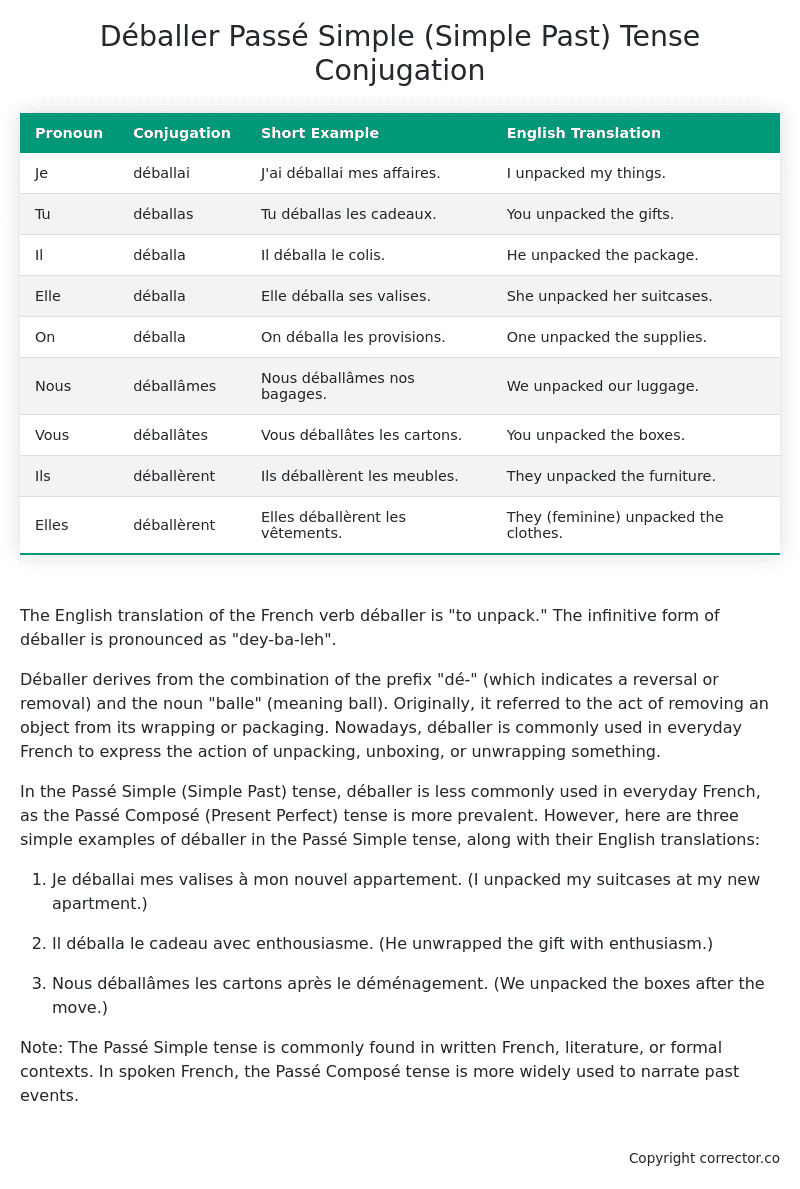Passé Simple (Simple Past) Tense Conjugation of the French Verb déballer
Introduction to the verb déballer
The English translation of the French verb déballer is “to unpack.” The infinitive form of déballer is pronounced as “dey-ba-leh”.
Déballer derives from the combination of the prefix “dé-” (which indicates a reversal or removal) and the noun “balle” (meaning ball). Originally, it referred to the act of removing an object from its wrapping or packaging. Nowadays, déballer is commonly used in everyday French to express the action of unpacking, unboxing, or unwrapping something.
In the Passé Simple (Simple Past) tense, déballer is less commonly used in everyday French, as the Passé Composé (Present Perfect) tense is more prevalent. However, here are three simple examples of déballer in the Passé Simple tense, along with their English translations:
-
Je déballai mes valises à mon nouvel appartement.
(I unpacked my suitcases at my new apartment.) -
Il déballa le cadeau avec enthousiasme.
(He unwrapped the gift with enthusiasm.) -
Nous déballâmes les cartons après le déménagement.
(We unpacked the boxes after the move.)
Note: The Passé Simple tense is commonly found in written French, literature, or formal contexts. In spoken French, the Passé Composé tense is more widely used to narrate past events.
Table of the Passé Simple (Simple Past) Tense Conjugation of déballer
| Pronoun | Conjugation | Short Example | English Translation |
|---|---|---|---|
| Je | déballai | J’ai déballai mes affaires. | I unpacked my things. |
| Tu | déballas | Tu déballas les cadeaux. | You unpacked the gifts. |
| Il | déballa | Il déballa le colis. | He unpacked the package. |
| Elle | déballa | Elle déballa ses valises. | She unpacked her suitcases. |
| On | déballa | On déballa les provisions. | One unpacked the supplies. |
| Nous | déballâmes | Nous déballâmes nos bagages. | We unpacked our luggage. |
| Vous | déballâtes | Vous déballâtes les cartons. | You unpacked the boxes. |
| Ils | déballèrent | Ils déballèrent les meubles. | They unpacked the furniture. |
| Elles | déballèrent | Elles déballèrent les vêtements. | They (feminine) unpacked the clothes. |
Other Conjugations for Déballer.
Le Present (Present Tense) Conjugation of the French Verb déballer
Imparfait (Imperfect) Tense Conjugation of the French Verb déballer
Passé Simple (Simple Past) Tense Conjugation of the French Verb déballer (You’re reading it right now!)
Passé Composé (Present Perfect) Tense Conjugation of the French Verb déballer
Futur Simple (Simple Future) Tense Conjugation of the French Verb déballer
Futur Proche (Near Future) Tense Conjugation of the French Verb déballer
Plus-que-parfait (Pluperfect) Tense Conjugation of the French Verb déballer
Passé Antérieur (Past Anterior) Tense Conjugation of the French Verb déballer
Futur Antérieur (Future Anterior) Tense Conjugation of the French Verb déballer
Subjonctif Présent (Subjunctive Present) Tense Conjugation of the French Verb déballer
Subjonctif Passé (Subjunctive Past) Tense Conjugation of the French Verb déballer
Subjonctif Imparfait (Subjunctive Imperfect) Tense Conjugation of the French Verb déballer
Subjonctif Plus-que-parfait (Subjunctive Pluperfect) Tense Conjugation of the French Verb déballer
Conditionnel Présent (Conditional Present) Tense Conjugation of the French Verb déballer
Conditionnel Passé (Conditional Past) Tense Conjugation of the French Verb déballer
Conditionnel Passé II (Conditional Past II) Tense Conjugation of the French Verb déballer
L’impératif Présent (Imperative Present) Tense Conjugation of the French Verb déballer
L’impératif Passé (Imperative Past) Tense Conjugation of the French Verb déballer
L’infinitif Présent (Infinitive Present) Tense Conjugation of the French Verb déballer
L’infinitif Passé (Infinitive Past) Tense Conjugation of the French Verb déballer
Le Participe Présent (Present Participle) Tense Conjugation of the French Verb déballer
Le Participe Passé (Past Participle) Tense Conjugation of the French Verb déballer
Struggling with French verbs or the language in general? Why not use our free French Grammar Checker – no registration required!
Get a FREE Download Study Sheet of this Conjugation 🔥
Simply right click the image below, click “save image” and get your free reference for the déballer Passé Simple tense conjugation!

Déballer – About the French Passé Simple (Simple Past) Tense
Formation
Usage
Narration
Historical Context
Interactions with other tenses
Passé Composé
Imparfait
Conditional and Subjunctive
Summary
I hope you enjoyed this article on the verb déballer. Still in a learning mood? Check out another TOTALLY random French verb conjugation!


